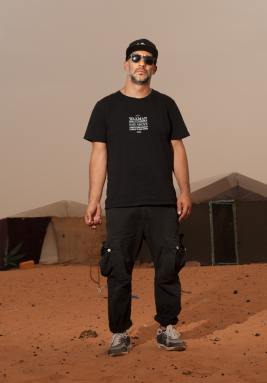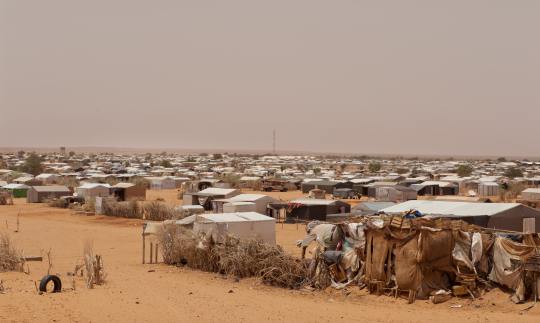|
Upon hearing the pastiche of sound of M’Berra by Khalab and M’berra Ensemble, you might begin to wonder what it’s all about, as it’s replete with seemingly random conversational sounds in various tongues, spliced with French; percussion phrases of compelling mystique; primordial stringed sounds; electronic inputs that waft, crackle, crinkle or shock; and soulful melodies. What M’berra is about is the soundscape of life in the refugee village of M’berra, in Mauritania just over the border with Mali It has been home to people upturned by ongoing raids and armed conflict in the Sahel since the late 1990’s. M’berra Ensemble tap into the inevitable urge of camp dwellers to make music, a first line of comfort in times of loss and grief, fear and panic, in which to seek personal solace and confirmation of group identity. And a stirring hour or two in which to forget.
Due at least in part to the Islamist pogroms against music makers in the Sahel, the M’berra camp has hosted some notable musicians. Apprised of them and their plight, techno explorer Raffaele Costantino a.k.a. Khalab brought his electronica there and embarked on an ambitious venture to provide them a forum in which to perform and record in community that would, at the same time, give listeners far from the camp an inkling of life there.
 Challenged to integrate the music and culture of Northern Malians with that of the semi-nomadic Tuaregs, Khalab was able to finesse the fruits of on-site recording under desert conditions into a silky studio achievement of both brazen and suave magnitude.
Challenged to integrate the music and culture of Northern Malians with that of the semi-nomadic Tuaregs, Khalab was able to finesse the fruits of on-site recording under desert conditions into a silky studio achievement of both brazen and suave magnitude.
In keeping with the grandness of the music, the accompanying booklet is sumptuous, embellished by splashes of mercury coursing through the informative, respectful appendix like drunken bolts of lightening passing the musicians wrapped iconically in starched and polished boubous against the sun, the sand and the scirocco. It’s worth noting that Fadimata Walett Oumar (“Disco”), the founder of Tartit, a woman-dominated Tuareg band who have seen success worldwide since the ‘90s, gives an eloquent testament here to the music and its makers.

|
|
The journey into the desert begins with “Desert Storm” and the daily sounds of the camp’s thirty years, in what could be a market, or under a shady tree where the townsmen gather after lunch to converse and share wisdom, perhaps verses of the Quran: we hear men’s spoken voices, children’s in the background and more extraneous bustle further off-mic, all helping to define the locale and its ethos.This mis-en-scène is interrupted by a brief chorus of Tuareg melody and voice, before a rumbling, ominous electronic crescendo returns the track to the recitative of the camp, enhanced now by tinkling sounds, as of bells dancing around the collars of strolling goats. The song ends craftily with the evocative sound of tape rewinding, begging the listener to supply the metaphor. Or not.

|
|
The next two tracks, “The Griot Speaks,” and “We are M’berra,” affectingly bring us into the camp by personalizing its inhabitants. In the first, a griot utters a short and urgent spoken passage, backed minimally by simple repeating ngoni phrases and skeletal percussion. This keeper and pillar of the culture seems to be beseeching his listeners towards an end, to me undecipherable.
In “We are M’berra,” reverential and mesmerizing electronic riffs on the traditional rhythms act as the backdrop for the members of the Ensemble to introduce themselves. They litanize, in their own language, their ethnic group as well as their musical affiliation, their abandoned homelands—many were living in Timbuktu, where the raids were fierce. Some express thanks to have been able to play outside the camp during these long, dry, years.
“Curfew” (video below) is one of, if not the most, wayward of the arrangements, as Khalab teases the seductive ngoni, piling on percussive distortions to sabotage its ageless acoustic integrity, and reducing its melodic opening role to merely keeping time. A guitar overrides the diminished ngoni by going increasingly electro-fuzzy and buzzy. And the dulled patter of happy-feet percussion adds heart-racing excitement and drive to this dynamic piece.

|
|
M’berra is an artistically successful even cutting edge album produced with heart. But its ultimate impact on the M’berra community is more important than critical acclaim by comfortable critics from the former(?) imperialist world. Has M’berra impacted or uplifted the lives of those who have survived in the camp? Has it inspired the artistry and expression of the musicians who live within? Of those who have played on the album? Has it brought the cultures on the outside, with a tradition of breaking tradition, any closer to those on the inside clinging to tradition?
Perhaps we should refer to Fadimata Walett Oumar for guidance: “His [Khalab’s] music is new to us, it is so difficult to understand! At the same time, as I listen and listen again to it, I feel that his music is well harmonized with our voices, our songs, our instruments. I am strongly convinced of the power of innovation of the individual. The mixing of musical genres will keep our tradition alive.” Inch’allah.
Find more online.
Photos: Jean-Marc Caimi
|
